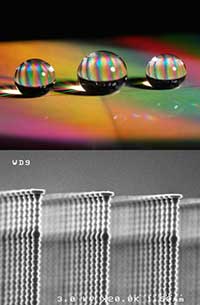Jan 30 2008
Sculpting a surface composed of tightly packed nanostructures that resemble tiny nails, University of Wisconsin-Madison engineers and their colleagues from Bell Laboratories have created a material that can repel almost any liquid.
 Top: Liquid beads on a surface composed of silicon "nanonails. Bottom: Silicon "nanonails" created by Tom Krupenkin and J. Ashley Taylor of University of Wisconsin-Madison's Department of Mechanical Engineering
Top: Liquid beads on a surface composed of silicon "nanonails. Bottom: Silicon "nanonails" created by Tom Krupenkin and J. Ashley Taylor of University of Wisconsin-Madison's Department of Mechanical Engineering
Add a jolt of electricity, and the liquid on the surface slips past the heads of the nanonails and spreads out between their shanks, wetting the surface completely.
The new material, which was reported this month in Langmuir, a journal of the American Chemical Society, could find use in biomedical applications such as "lab-on-a- chip" technology, the manufacture of self-cleaning surfaces, and could help extend the working life of batteries as a way to turn them off when not in use.
UW-Madison mechanical engineers Tom Krupenkin and J. Ashley Taylor and their team etched a silicon wafer to create a forest of conductive silicon shanks and non-conducting silicon oxide heads. Intriguingly, the ability of the surface of the structure to repel water, oil, and solvents rests on the nanonail geometry.
"It turns out that what's important is not the chemistry of the surface, but the topography of the surface," Krupenkin explains, noting that the overhang of the nail head is what gives his novel surface its dual personality.
A surface of posts, he notes, creates a platform so rough at the nanoscale that "liquid only touches the surface at the extreme ends of the posts. It's almost like sitting on a layer of air."